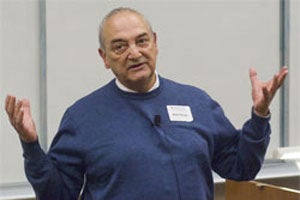With a mixture of storytelling about his groundbreaking role in amateur basketball and critiques of the NCAA and NBA, former sports marketing executive Sonny Vaccaro gave the keynote address at the third annual HLS Sports Law Symposium on March 25.
The conference focused on college athletics, with panels on amateurism, conference realignment, athlete-agent relationships, litigation against the NCAA, and the Bowl Championship Series.
The multibillion-dollar industry that college athletics is today can in many ways be traced to Vaccaro. After starting an influential all-star game for high school basketball players, he worked for Nike in the 1970s, when he began the practice of paying college basketball coaches to showcase the company’s products on their teams. In some cases, he would pay the coaches more than their colleges did, he said. “I just gave them a business deal they couldn’t refuse,” said Vaccaro, who has been dubbed the godfather of grassroots basketball.
Those deals, which he eventually expanded to include university-wide athletic programs, were “the start of the NCAA allowing outside interests in schools,” Vaccaro said. He also ushered in the era of multimillion dollar sneaker endorsements, signing superstar players such as Michael Jordan and Kobe Bryant.
“I started the commercialism,” he said. “All the ones who want to beat me up are right.”
No longer associated with sports apparel companies after resigning from Reebok in 2007, Vaccaro has become an advocate for student-athletes. He consults for the plaintiffs in the class action suit O’Bannon v. NCAA, in which former college athletes are seeking compensation from the NCAA for commercial products that exploit their likenesses and images. (Ed O’Bannon, the named plaintiff who had a brief NBA career after starring at UCLA, participated in the conference panel on litigation.)
“The very fact that they can … say we own you for perpetuity is ridiculous,” said Vaccaro.
Vaccaro spoke out against the NCAA transfer rules that prevent college athletes from playing for a different school for a year. Coaches, he added, have no such restrictions. He also noted that colleges derive millions of dollars from student-athletes without compensating the performers.
“There’s not one rule in that rule book that advocates for the athlete,” he said. “Everything they write prevents the athlete from doing something.”
Vaccaro criticized the NBA for requiring incoming players to wait at least one year out of high school before becoming eligible for the draft. Before that rule was instituted, players like Kobe Bryant, Kevin Garnett, and Dwight Howard went to the league straight from high school, he noted.
Vaccaro is devoting much of his time to speaking engagements and the O’Bannon suit in order to expand opportunities for the athletes who “gave me this life,” he said. Though he said he doesn’t hold a vendetta against the NCAA, he wants to change a system he believes is exploitive.
“What I wanted to do was spread a message about how young kids were misused in the system of the NCAA,” said Vaccaro.
He started one revolution in sports, he said. And now, through a different kind of court, he wants to start another.
